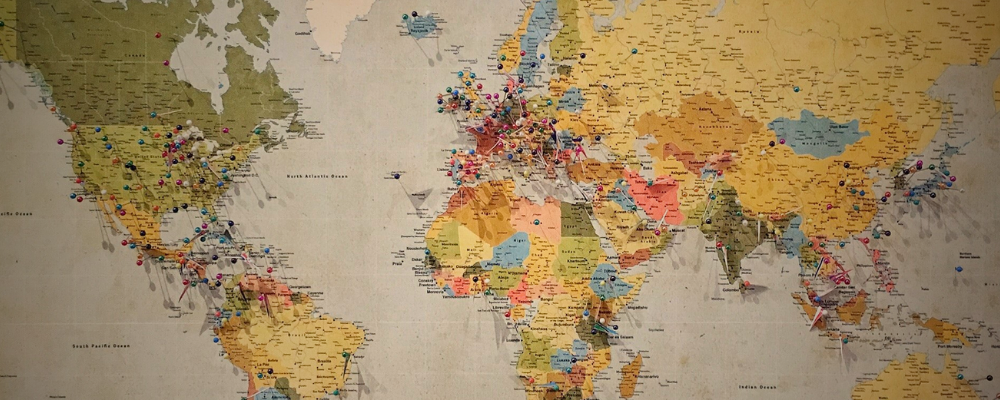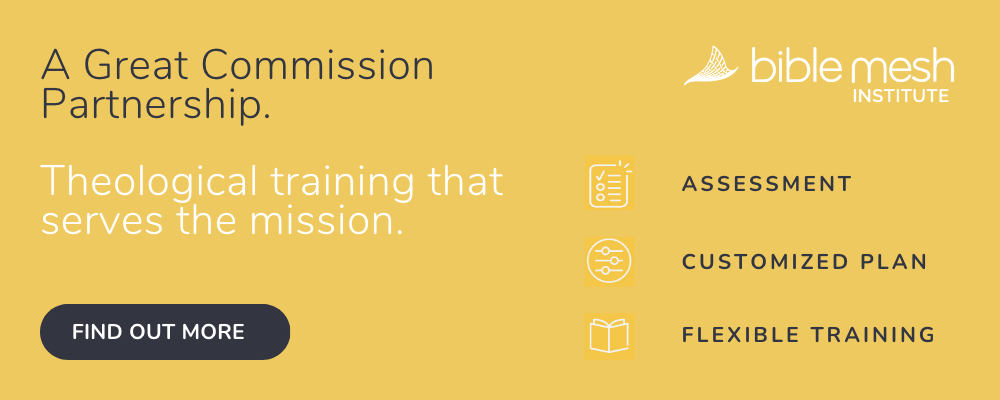In this series of blog posts, Dean of the BibleMesh Institute Dennis Greeson explores questions related to theological education and training for cross-cultural ministry. The questions and answers have been adapted from a Global Missions Podcast episode.
In this series, Dr. Greeson considers how to define the nature and task of theological education, especially for missionaries, considers common barriers to theological education, and looks at trends in how models for theological education are becoming more innovative and effective in preparing missionaries to join God’s work around the world.
Q. What is the role of the local church, pastor, and missions committee in the theological preparation of cross-cultural goers?
Local churches, pastors, and missions committees have a stake in the mission of God as they send out members from the church to engage in a specific calling in ministry. They have, at the very least, a call to vet that person, to say, are they ready? Are they spiritually ready? Are they mature enough? Do they walk with the Lord and demonstrate a holiness of living, a love for God and neighbor, et cetera?
They also must determine if they have the skills and abilities to succeed in what they’ve been called to do. If they don’t, the committee, the pastor, the stakeholders have the responsibility to hit the brakes and say, “God’s mission isn’t dependent on you. Take some time and become equipped so that you might be most faithful in what the Lord has called you to.”
Yes, we want to help get people to the field quickly. And on-the-field training is a reality. There are BibleMesh students who are on the field and learning as they go. But missionaries need a foundation. It’s healthy to have a season of learning prior to doing. It’s the senders, the stakeholders in the local church, who are best positioned to evaluate someone’s readiness. Fellow church members, pastors, and even supervisors can see patterns and deficiencies better than the individual who is eager to go.
There are BibleMesh students who are on the field and learning as they go. But missionaries need a foundation. It’s healthy to have a season of learning prior to doing.
Missions committees or pastors should also counsel candidates as to the best options for their training, not just determine that they need it. They should help them step back and say, “What do I need? What would be the best use of this time of preparation?” Those are the two areas of responsibility I think the local church has at the very least in the vetting process.
Once they’re sent out, that responsibility doesn’t end. Once they’re actually engaged in the ministry, whether internationally or locally, it is still the committee’s or pastor’s responsibility to ensure that they continue to have the resources they need. The sent individual or family should continue to be accountable and connected to the local church. The committee or pastor is the lifeline that anchors someone to the local body of Christ from which they’ve been sent.
While there’s much more said lifeline involves, it does include theological education, or you might say continuing education. The sending committee and pastor can help encourage whoever has gone out to continue to study, to be challenged, to grow, and not presume that the learning task is ever complete.
Q. How does BibleMesh partner with a local church to help prepare missionaries?
One way that we do that is by helping to train the whole church. BibleMesh provides curriculum, resources, and courses that are designed for pastors who need to advance their studies and laypeople who want to learn how to read their Bible well.
We can help equip a church to get on mission with God by introducing them to the biblical story, helping them understand the key contours of the Christian faith, and catch a vision for what God is doing in the world. These resources and trainings are designed for use in small group studies or in leadership.
When a church is looking to send a person to the field, wherever that field may be, and the individual needs formal, disciplined training, the church will often send that person through an agency.
To facilitate this training we partner with several different organizations. I’ve already mentioned Christar. We also work with Pioneers, TEAM, Cafe1040, Frontiers, and Kontaktmission, just to name a few. Individuals receive training through us that meet the requirements of those various sending agencies.
That training varies depending on the agency requirements. It could be six courses in the basics of Bible and theology. Or, and this is where I think the new opportunities for rethinking theological training gets exciting, we may assess the skills and competencies and knowledge they already possess, and then create a custom plan for them to shore up what is lacking.
this is where I think the new opportunities for rethinking theological training gets exciting, we may assess the skills and competencies and knowledge they already possess, and then create a custom plan for them to shore up what is lacking
Individuals can also apply to BibleMesh on their own and take a certificate track for credit at the college or seminary level. These individuals are paired one-on-one with a credentialed instructor (someone who has a PhD and most likely field experience). About half of our teaching fellows currently are or have been missionaries, pastors, or missionary trainers.
The format of the program is flexible. People can start any month of the year rather than enrolling in a semester. You pay for the time it takes you to finish a course. If you need a pause, or go on a three week vision trip, you simply stop the course and don’t pay for that time. When you’re ready to start back, we simply put you back in the course and reintroduce you to the instructor.
BibleMesh also partners with churches or organizations to do customized trainings in which our curriculum can be combined with curriculum the organization or church already has. We package it all into a course, provide the necessary infrastructure, and let them teach it, while also providing requested advice.
BibleMesh also partners with churches or organizations to do customized trainings in which our curriculum can be combined with curriculum the organization or church already has.
Concerning the exciting changes in theological education that someone would experience by coming to us, the emphasis is on competency.
There’s been a shift in higher education from thinking in terms of degree to terms of competency. Rather than requiring everyone to take the same twelve courses to earn a degree, a competency-focused format requires a candidate to demonstrate that they have the skills and knowledge equivalent to a master’s degree in a given subject. There’s a list of what they should be able to do and know. But they don’t necessarily have to get there through the traditional model. We create a customized education journey for them over two, three, or four years, however long it will take them to gain those required competencies. Those competencies may not always come through a three-hour course in a classroom.
At BibleMesh we’ve integrated this competency-based model into our program and it is an approach that we’re very excited about. For instance, consider our partnership with Christar (a sending agency out of Texas that focuses on the 10/40 Window). The candidates they send to us take an initial assessment by which we determine their level of biblical and theological knowledge, as well as their ability to interpret and apply that knowledge to teach others.
The report they receive after the initial assessment indicates their strengths and weaknesses as well as the necessary courses to gain required competencies. After completing those requirements, we conduct a final interview in which we determine whether they have learned and are able to do to everything necessary.
Then we send them back to Christar, having taken the equivalent of three credit hours, six credit hours, or however long it took to gain the requisite skills. The technology and the model we use allows us to customize education to fit someone’s individual needs.
I think that’s the direction theological education ought to be heading, and we want to be on the forefront of that.
This ends our four part series on How Should Missionaries and Mission Agencies Think About Theological Education?
Dr. Dennis Greeson is Dean of the BibleMesh Institute and Research Fellow in Public Theology for The Land Center for Cultural Engagement. He is also a PhD Research supervisor at Union Theological College, Belfast, and teaches and writes on theology, culture, and public square issues.

